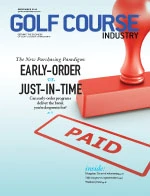 Monroe Miller Monroe Miller |
My friend recently left the ranks of golf course superintendents and is considering a career in turf sales. It’s a lateral move of sorts and he will be on familiar ground among people he knows. The product line he represents will primarily target golf courses.
He is eminently qualified for the position after a successful career that included golf course construction and another dozen years as a superintendent. He’s backed by a four-year degree in turf from one of the major institutions.
A recent invitation for a cup of coffee was an opportunity for him to pick my brain and tap into someone like myself who has had decades of experience spending money. Essentially, he wanted to know what I looked for in a salesperson.
I have seen many changes in the turf sales profession and most of them have been positive. As a group they are well educated, often in turf, and have excellent communication skills and the equipment to go with them. Many have worked on golf courses. They are very professional, and the days of the good ol’ boys offering a TV with a 10-ton order of fertilizer are over.
So, I offered the observations and advice, which I have included here in no particular order:
Cultivate trust. That well of trust, to me, is about honesty. If you cannot be anything else, be honest.
Make reliability your trademark. Let me depend on you without question, whether it’s delivery of a repair part I desperately need or a couple of cases of fungicide.
Be pleasant to everyone, no matter how difficult at times. No one enjoys a visit from a jerk. And you cannot appear to be arrogant or rude.
Know your product line. One of my all-time favorite salesmen was a former superintendent who was an excellent equipment operator. He could have made a living as a mechanic. His knowledge about what he was selling gave me full confidence what he said.
A good sales rep, in some ways, is like an extension agent – a source of good information about golf course conditions elsewhere and what superintendents are doing to deal with them. This was even more relevant before the days of the Noernet and Internet communications, but it is still an important aspect of a good salesperson. With our noses to the turf grindstone for weeks and weeks on end, we often are anxious to hear the news from out and about, and salespeople are our only resource at times. The flip side is just as important: Do not be a gossip. Nothing will ruin your credibility quicker.
Be a good citizen in our profession. Exhibit and attend our field day and winter conference. Be part of our projects and programs, scholarship and social events. Advertise in our chapter publications.
Give me your best price first. Don’t offer to match someone else’s lower price or after you fear losing the sale. This goes back to trust. Although I might be a loyal customer, do not take my business for granted. There is no surer way to lose it.
Sell your product on its merits and price. Don’t tear down the competition or rip their sales reps.
Don’t be late. Appointments are a fairly recent development in our business and an excellent improvement over unannounced stops. That said, do not be late unless you call the customer. And accept that sometimes the superintendent cannot meet – issues like irrigation leaks or disease outbreaks will always take precedent. And always know when to leave.
Don’t be a sore loser. Likely you are not going to sell every course everything they need. A sorehead won’t be welcome anywhere.
In this era of IRAs and 401(K)s you frequently hear “before you take a financial advisor’s advice on a stock or a fund, find out how much he is getting paid for the sale.” I’ll never forget the time, early in my career, when a salesman drove me crazy trying to sell me a snow mold fungicide I wasn’t interested in using. He finally admitted he was getting a $20 spiff on each drum and tried to shame me into helping give his family a better Christmas! It didn’t work; guilt, intimidation, shame and all of those kinds of emotions are very poor sales tools. Don’t use them.
Work hard to develop customer loyalty. It will help set you apart from others who are selling almost the same products you are. And it will take time. There are reasons why I like Ford vehicles, Case pocketknives, Ertl farm toys, Redwing boots and Carhart jeans. Customer loyalty can be golden for you. It can also require a lot of work to overcome if the loyalty isn’t to your products.
I hope my friend makes it in the world of selling turf products. It will be a tough job but a rewarding one. His success and respect will be whatever he earns.
|
 Monroe Miller
Monroe Miller





